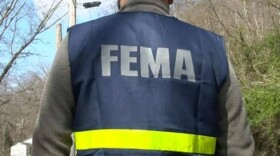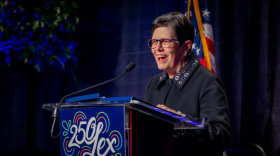ARI SHAPIRO, HOST:
Thousands of Palestinians returned to northern Gaza today. Many fled in the early days of the war and haven't been back in more than 15 months. The Israeli military let people return as part of the ceasefire deal with Hamas. One of those returning home was NPR's producer in Gaza, Anas Baba. He walked back to his city today and sent us voice memos along the way. Here's NPR's Kat Lonsdorf with more.
KAT LONSDORF, BYLINE: Anas starts his day early.
ANAS BABA, BYLINE: It's almost 5:30 a.m. Drones - there's already drones in the sky.
LONSDORF: He's sporting a freshly trimmed beard. He got a barber friend to clean him up before the journey.
BABA: 'Cause I'm feeling like today is my wedding. And I'm finally returning back, and I wanted to look as best as possible.
(CROSSTALK)
LONSDORF: As the sun is rising, he starts the walk with thousands of others.
BABA: It's a scene of joy. Everyone is just, like, saying hi to everyone. They are walking with an energy. Even you can see the elderlies are walking like they are young.
LONSDORF: Everywhere around him are scenes of celebration.
UNIDENTIFIED CHILDREN: (Chanting in non-English language).
BABA: People are chanting. Some of them, they use drums and instruments as celebration.
(SOUNDBITE OF DRUMS BANGING)
UNIDENTIFIED PEOPLE: (Singing in Arabic).
LONSDORF: The walk takes hours, but that energy persists.
BABA: Now I'm getting closer to the outskirt of Gaza City. I'm feeling that there is, like, shiver all over my body - electricity that just, like, gives me more energy to keep going, to keep walking. I'm sorry that my voice is truly, like, thrilled, but I'm extremely happy. I'm grateful.
(CROSSTALK)
LONSDORF: As he goes, people who have been in the north throughout the war start to meet people coming from the south...
BABA: It's truly unbelievable.
LONSDORF: ...Including this moment.
WAFAA IBRAHIM AL-ARAIR: (Speaking Arabic).
BABA: A mother, that she met finally her own son that she was leaving him in Gaza City.
AL-ARAIR: (Speaking Arabic).
BABA: She's in tears.
LONSDORF: He stops to interview the mom, Wafaa Ibrahim Al-Arair.
AL-ARAIR: (Speaking Arabic).
LONSDORF: "Wow," she says. "I left a boy behind, and now I find him a young man."
AL-ARAIR: (Speaking Arabic).
LONSDORF: Anas keeps walking. The main road he's walking is along the sea, and he takes a deep breath.
(SOUNDBITE OF INHALING)
BABA: I truly miss the Mediterranean Sea air, especially the Gaza Mediterranean. Most of the people here keep saying the same thing - now we can breathe again.
LONSDORF: And then...
BABA: Finally, I entered Gaza City.
LONSDORF: But it's a sobering reality, even amongst the celebration.
BABA: Nothing is still the same. I can't find any landmark. I don't know exactly what to do here, what to say. There is not much to express. There is not much to describe here. Rubble's everywhere, destruction everywhere, but you can feel the positive energy. They are trying to hold up. They are trying to carry on. It's not the same anymore.
SHAPIRO: That's NPR's Anas Baba returning home to North Gaza and NPR's Kat Lonsdorf in Tel Aviv. Transcript provided by NPR, Copyright NPR.
NPR transcripts are created on a rush deadline by an NPR contractor. This text may not be in its final form and may be updated or revised in the future. Accuracy and availability may vary. The authoritative record of NPR’s programming is the audio record.







